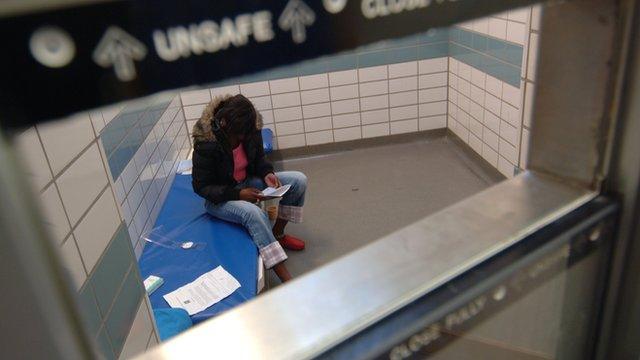Fresh calls to send foreign prisoners home
- Published
- comments

There are 10,837 foreign national offenders in our prisons which make up 13% of the prison population, said Philip Hollobone MP
The issue of foreign prisoners in England's jails has long been a contentious one.
It cost Charles Clarke his job, external as home secretary when back in 2006 it emerged that more than 1,000 foreign prisoners who should have been deported hadn't been. It's also been the subject of several select committee inquiries.
And it continues to vex the Conservative MP for Kettering, Philip Hollobone.
Throughout his time as an MP he has raised concerns about the number of foreigners in our prisons and our failure to send them back home to serve their sentences.
Now a government minister not only praised him for his campaign, but admitted that he too shares Mr Hollobone's frustration.
Mike Penning, minister for policing and criminal justice, told Parliament that while being briefed by officials he was "very surprised... about some of the things that are being done" and found it "mind bogglingly difficult to work out why, in many cases, things do not happen."
He was replying to a debate called by Mr Hollobone who had come up with some new figures about the extent of the problem.
There are, he told MPs, 10,837 foreign national offenders in our prisons which make up 13% of the prison population.
The highest number of offenders (938) come from Poland, followed by Ireland (779) and Jamaica (737).
The cost of looking after them, he said was "north of £300m" a year.
"Such people need to serve their sentences in secure detention in prisons in their own country," he said.
"At a time of severe constraints on public expenditure, that is far too large a bill to ask British taxpayers to pay."
Absolute outrage
Mr Hollobone is particularly angry that many of these countries do not have prisoner transfer agreements with the UK.
A compulsory agreement with Jamaica is still awaiting ratification by the Jamaican government, there is "only" a voluntary agreement with Pakistan and India and no agreement with Somalia or Bangladesh or several EU countries including Poland.
"Poland, which is top of the list with almost 1,000 of its nationals in our prisons, has a specific derogation from accepting prisoner transfers under that EU agreement until the end of December 2016," said Mr Hollobone.
"That is an absolute outrage. Poland should be securing those people in secure detention back in Poland, at the expense of Polish taxpayers."
He is also calling for the British government to use "the huge and increasing international aid budget to build suitable prisons in countries that provide us with a large number of prisoners."
He has discovered that in 2012 we gave £973m in aid to Jamaica, Pakistan, Nigeria, Somalia, India and Bangladesh who have a total of 2,900 of their citizens in British jails.
"It costs this country more than £100m a year to incarcerate these people in our jails.
"It would be a good idea to spend some of that £973m on building prisons in those six countries," he argued.
Shared 'frustration'
Mr Penning admitted that he had been briefed by his officials "to ensure that I stuck to the line and read the speech, which I will not do".
He went on to admit that he agreed with nearly everything Mr Hollobone had said: "The frustration that he can hear in my voice was in his voice. I share his frustration."
The minister said he would like to see as many foreign nationals as possible serve their sentences in their country of origin and he added that it was important that "our friends in Europe fulfil their commitments".
"I agree that we have to work much harder because this matter has been ignored for too many years," he said.
Eight years in fact since Charles Clarke was forced to resign and it's looking like it could be the same again until any resolution is found.